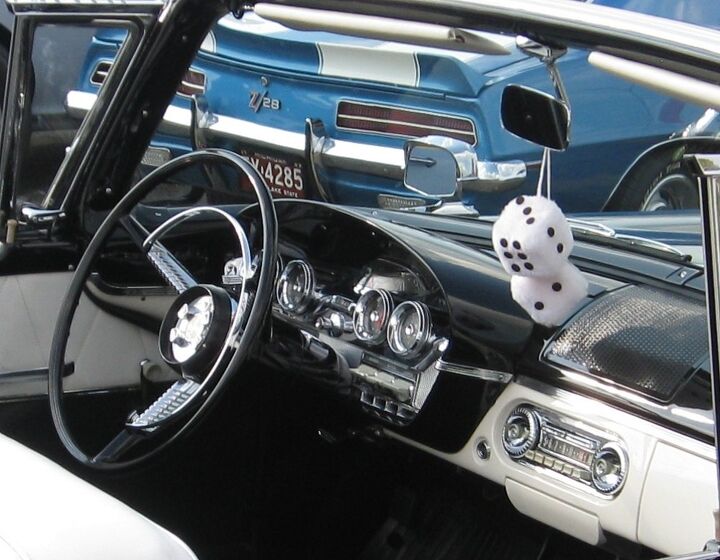Did Sputnik Doom the Edsel?

When I noticed Michael Beschloss did a piece on the failure of the Edsel, I thought it was pretty cool that a historian of his reputation would write about cars. Beschloss is better known for writing about U.S. presidents than automobiles.
After reading his piece in the New York Times, Hubris, and Sputnik, Doomed the Edsel, I’m less impressed with his reputation.
Note the push-button automatic transmission controls in the steering wheel hub.
As you can tell from the headline at the NYT, Beschloss’ thesis is that the USSR’s Oct. 4, 1957 launch of the Sputnik satellite, exactly one month after Ford’s more terrestrial “E Day” launch of the Edsel brand, doomed the new car line by making its gimmicky features seem frivolous in a more serious age.
Far be it from a mere automotive scrivener like your humble servant to challenge a noted presidential historian, but not only do I think Beschloss’ point about the Soviet satellite is way overstated, he doesn’t even credit the Ford marketing executive who first attributed the Edsel’s failure to Sputnik’s success. Instead, he rather unfairly uses that same executive as an object lesson on the domestic auto industry’s hubris.
To his credit, Beschloss does refer to other factors that contributed to the Edsel’s market failure and Ford Motor Company’s decision to shutter the brand after only three model years.
The car was introduced just as the United States was entering a deep recession, one that would coincidentally be aggravated by a long strike at General Motors by the United Auto Workers. The styling of the Edsel was odd enough to be the butt of jokes. Initial quality was abysmal, with poorly fitted body panels and problems with the push-button automatic transmission controls located on the steering wheel hub. The Edsel became enmeshed in a power struggle at Ford, long considered a bit of a vipers’ pit of office politics. Once the car went on sale, industry, enthusiast and consumer publications were highly critical.
The 1959 Edsels had less controversial styling.
The basic idea of the Edsel, when it was conceived in 1955, was to carve out space in the mid-priced segment to allow Mercury to go upmarket. What Beschloss doesn’t say is, by the middle of 1957, Ford knew the mid-priced segment had declined 40% since 1955’s banner sales year, against a 16% overall decline in the market for new cars in general. Even before the Edsel went on sale, people within Ford questioned its potential for success.
By the 1960 model year, Edsel styling had been considerably toned down…
Just prior to the Edsel’s launch, Ford put on a gala dinner dance in Dearborn for the various teams involved in the Edsel project to celebrate, including their ad agency – Foote, Cone & Belding. At the dinner was Robert S. McNamara, later to be U.S. Defense Secretary under Presidents Kennedy and Johnson, then general manager for Ford’s car and truck divisions. Beschloss, citing Thomas E. Bonsall’s book Disaster in Dearborn, relates how McNamara, gestured at the guests from FCB, and
told Fairfax M. Cone, “Of course, you realize you’re going to have to let all of these people go,” adding that he was planning to “phase out” the Edsel.
Those quotation marks around “phase out” are a little bit troubling. The actual quote in Bonsall’s book makes it clear that McNamara’s wording was slightly different and was a bit more emphatic:
“Of course, you realize you’re going to have to let all of these people go. We’ve decided to discontinue the Edsel.”
The Edsel was actually doomed before either it or the Sputnik was launched.
… at least on the front end. Ford saved plenty of weird for the ’60 Edsel rear end.
Those quotation marks aren’t the only problem I have with Beschloss’ article. Beschloss uses a 1960 quote by David Wallace, then Ford’s planning director for special projects market research, to show that lessons weren’t learned from the Edsel’s failure.
Mr. Wallace went on, “There’s some irrational factor in people that makes them want one kind of car rather than another — something that has nothing to do with the mechanism at all, but with the car’s personality, as the customer imagines it.”
Even in hindsight, Mr. Wallace seems not to have learned the overwhelming lesson of the Edsel fiasco: While consumers of the time may have been momentarily intrigued by the car’s much ballyhooed “personality,” they were shrewd enough, especially as Cold War and economic anxieties descended, to quickly see through Ford’s claims that the Edsel was something “entirely new.”
It’s interesting, and perhaps a bit unfair, that Beschloss uses Wallace as an object lesson in failing to learn lessons from failure, because it seems likely to me that the historian got his Sputnik thesis from the very same David Wallace, though without attributing it to him.
From page 143 of Thomas Bonsall’s book on the Edsel imbroglio (emphasis added):
After the fact, in their personal postmortems, Edsel Division executives were widely divergent in recalling when they decided the Edsel was in trouble. Warnock [C. Gayle Warnock, Ford PR chief] claimed to have sensed it as early as a couple of weeks after E-Day. Krafve [Richard E. Krafve, General Manager of the Edsel Division], got cold feet toward the end of October, while Doyle [J. C. (Larry) Doyle, General Sales and Marketing Manager Edsel Division] held out until mid-November. Wallace insisted years later that the turning point was October 4th – the day the Soviet Sputnik space craft went into orbit, and Americans suddenly began to question the validity of the American Dream itself.
The date of September 5th – the day of McNamara’s ascension – stands out, though. It would be unfair to say he hated the Edsel per se, for it went deeper than that. He hated complexity…
In light of the fact that Beschloss thought Wallace’s blaming of the Edsel’s failure on the Sputnik was worthy enough to repeat, albeit without crediting the source, one might think he’d consider that the Ford executive’s comments on consumers’ irrationality and cars’ personalities were also well informed, even if the Edsel is indeed a synonym for hubris and failure.
Photos by the author.
Ronnie Schreiber edits Cars In Depth, a realistic perspective on cars & car culture and the original 3D car site. If you found this post worthwhile, you can get a parallax view at Cars In Depth. If the 3D thing freaks you out, don’t worry, all the photo and video players in use at the site have mono options. Thanks for reading – RJS

Ronnie Schreiber edits Cars In Depth, the original 3D car site.
More by Ronnie Schreiber
Latest Car Reviews
Read moreLatest Product Reviews
Read moreRecent Comments
- Slavuta I drove it but previous style. Its big, with numb steering feel, and transmission that takes away from whatever the engine has.
- Wjtinfwb Rivaled only by the Prowler and Thunderbird as retro vehicles that missed the mark... by a mile.
- Wjtinfwb Tennessee is a Right to Work state. The UAW will have a bit less leverage there than in Michigan, which repealed R t W a couple years ago. And how much leverage will the UAW really have in Chattanooga. That plant builds ID. 4 and Atlas, neither of which are setting the world afire, sales wise. I'd have thought VW would have learned the UAW plays by different rules than the placid German unions from the Westmoreland PA debacle. But history has shown VW to be exceptionally slow learners. Watching with interest.
- Ravenuer Haven't seen one of these in years! Forgot they existed.
- Pig_Iron I one of those weirdos who liked these.















































Comments
Join the conversation
Ford Skyliner 1957-59 had the retractable hardtop. A very desirable collectors car. https://en.wikipedia.org/wiki/Ford_Fairlane_500_Skyliner
Several years ago there was someone around where I live that had a 59 Ford Skyliner that was turquoise and white. Absolutely cherry.